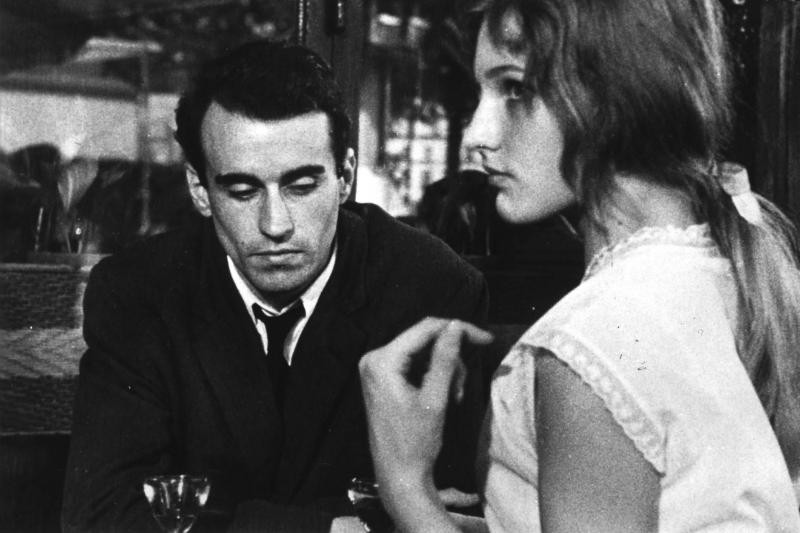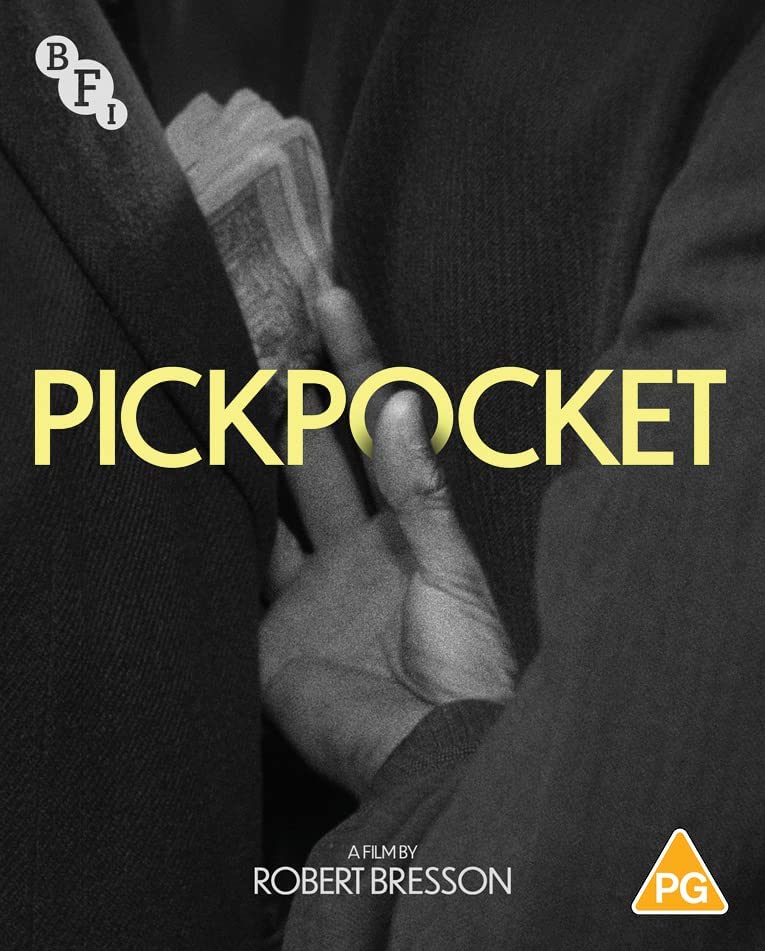Blu-ray: Pickpocket | reviews, news & interviews
Blu-ray: Pickpocket
Blu-ray: Pickpocket
Robert Bresson's 1959 classic is marred by excess of rigour

Pickpocket regularly makes it into the list of best films of all times. It is a film-maker’s film, more of an essay on the art of cinema and a discourse on crime than a thriller. Much French art house cinema is characterised by serious intent and intellectual rigour, and Bresson may be, more than any other auteur, the pioneer of a cinema in which reflection and thought play as much of a part as the display of narrative or emotional excitement.
Michel, played by the non-professional Martin LaSalle, is the thief who learns the tricks of his trade from a gang of professionals, and plays through the film a game of cat and mouse with the police. There are beautifully shot and edited sequences that demonstrate the fine dexterity and cliff-hanging risk of slipping a hand delicately in and out a pocket or a bag, and lifting the wallet or cash from mostly unsuspecting victims. Much is played out in the close quarters of the metro. The film always looks great, with cinematography by Léonce-Henri Burel.
The script, the first to be written by Bresson himself, owes much to Dostoyevsky’s Crime and Punishment. Like Raskolnikov in the Russian 19th century classic, Michel is tormented by reflections on the nature of crime and guilt. There is indeed – as with much of Bresson – an underlying connection with Catholicism.
 Michel is a master of impassivity, and a model of cool. He seems to be almost totally devoid of emotion – or at least knows how to hide it. So much so that he shows little interest in his ageing mother, and has to be coaxed by Jeanne (the Swedish actress Marika Green), the young woman who looks after her. That Michel should not show the flicker of a smile throughout is an essential feature of a film that avoids the display of affect, the mainstay of mainstream cinema, from first to last frame. Such an exercise in style is central to the film’s appeal and reputation, and yet, as with other Bresson films – stripped as they are of the engaging tropes of narrative cinema – I personally find the austerity unappealing. I am left with the suspicion that form, in this case carefully thought-out rather than growing organically from the emotional heart of the story, may impress by its rigour but make the films oddly unengaging. Even the brief musical interventions, French baroque by Lully – they provide a kind of ersatz emotion to the sequences in which they appear – feel more like an imposed feature than an expression of the characters’ inner drama. Much imitated (along with the voice-over that takes us through the film), these "Bressonian" motifs seem to be self-conscious reactions against the excess of French soundtrack giants such as Joseph Kosma, Georges Van Parys or Roger Désormière.
Michel is a master of impassivity, and a model of cool. He seems to be almost totally devoid of emotion – or at least knows how to hide it. So much so that he shows little interest in his ageing mother, and has to be coaxed by Jeanne (the Swedish actress Marika Green), the young woman who looks after her. That Michel should not show the flicker of a smile throughout is an essential feature of a film that avoids the display of affect, the mainstay of mainstream cinema, from first to last frame. Such an exercise in style is central to the film’s appeal and reputation, and yet, as with other Bresson films – stripped as they are of the engaging tropes of narrative cinema – I personally find the austerity unappealing. I am left with the suspicion that form, in this case carefully thought-out rather than growing organically from the emotional heart of the story, may impress by its rigour but make the films oddly unengaging. Even the brief musical interventions, French baroque by Lully – they provide a kind of ersatz emotion to the sequences in which they appear – feel more like an imposed feature than an expression of the characters’ inner drama. Much imitated (along with the voice-over that takes us through the film), these "Bressonian" motifs seem to be self-conscious reactions against the excess of French soundtrack giants such as Joseph Kosma, Georges Van Parys or Roger Désormière.
The bonuses on this BFI release offer rich pickings: a 1971 audio interview with Bresson; Les modèles de Pickpocket (Pickpocket’s Models) an excellent documentary by experimental film-maker Babette Mangolte, in which she talks to the actors who worked with him and whom he preferred to call "models"; and a revealing interview with writer and director Paul Schrader, who explains the various ways in which Pickpocket changed his life.
rating
Explore topics
Share this article
The future of Arts Journalism
You can stop theartsdesk.com closing!
We urgently need financing to survive. Our fundraising drive has thus far raised £49,000 but we need to reach £100,000 or we will be forced to close. Please contribute here: https://gofund.me/c3f6033d
And if you can forward this information to anyone who might assist, we’d be grateful.

Subscribe to theartsdesk.com
Thank you for continuing to read our work on theartsdesk.com. For unlimited access to every article in its entirety, including our archive of more than 15,000 pieces, we're asking for £5 per month or £40 per year. We feel it's a very good deal, and hope you do too.
To take a subscription now simply click here.
And if you're looking for that extra gift for a friend or family member, why not treat them to a theartsdesk.com gift subscription?
more Film
 Urchin review - superb homeless drama
Frank Dillane gives a star-making turn in Harris Dickinson’s impressive directorial debut
Urchin review - superb homeless drama
Frank Dillane gives a star-making turn in Harris Dickinson’s impressive directorial debut
 Mr Blake at Your Service review - John Malkovich in unlikely role as an English butler
Weird comedy directed by novelist Gilles Legardinier
Mr Blake at Your Service review - John Malkovich in unlikely role as an English butler
Weird comedy directed by novelist Gilles Legardinier
 Don't Let's Go to the Dogs Tonight review - vivid adaptation of a memoir about a Rhodesian childhood
Embeth Davidtz delivers an impressive directing debut and an exceptional child star
Don't Let's Go to the Dogs Tonight review - vivid adaptation of a memoir about a Rhodesian childhood
Embeth Davidtz delivers an impressive directing debut and an exceptional child star
 One Battle After Another review - Paul Thomas Anderson satirises America's culture wars
Leonardo DiCaprio, Teyana Taylor, and Sean Penn star in a rollercoasting political thriller
One Battle After Another review - Paul Thomas Anderson satirises America's culture wars
Leonardo DiCaprio, Teyana Taylor, and Sean Penn star in a rollercoasting political thriller
 Steve review - educator in crisis
Cillian Murphy excels as a troubled headmaster working with delinquent boys
Steve review - educator in crisis
Cillian Murphy excels as a troubled headmaster working with delinquent boys
 Can I get a Witness? review - time to die before you get old
Ann Marie Fleming directs Sandra Oh in dystopian fantasy that fails to ignite
Can I get a Witness? review - time to die before you get old
Ann Marie Fleming directs Sandra Oh in dystopian fantasy that fails to ignite
 Happyend review - the kids are never alright
In this futuristic blackboard jungle everything is a bit too manicured
Happyend review - the kids are never alright
In this futuristic blackboard jungle everything is a bit too manicured
 Robert Redford (1936-2025)
The star was more admired within the screen trade than by the critics
Robert Redford (1936-2025)
The star was more admired within the screen trade than by the critics
 Blu-ray: The Sons of Great Bear
DEFA's first 'Red Western': a revisionist take on colonial expansion
Blu-ray: The Sons of Great Bear
DEFA's first 'Red Western': a revisionist take on colonial expansion
 Spinal Tap II: The End Continues review - comedy rock band fails to revive past glories
Belated satirical sequel runs out of gas
Spinal Tap II: The End Continues review - comedy rock band fails to revive past glories
Belated satirical sequel runs out of gas

Add comment